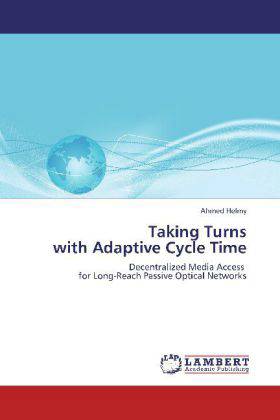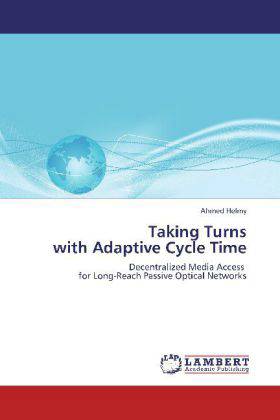
Door een staking bij bpost kan je online bestelling op dit moment iets langer onderweg zijn dan voorzien. Dringend iets nodig? Onze winkels ontvangen jou met open armen!
- Afhalen na 1 uur in een winkel met voorraad
- Gratis thuislevering in België vanaf € 30
- Ruim aanbod met 7 miljoen producten
Door een staking bij bpost kan je online bestelling op dit moment iets langer onderweg zijn dan voorzien. Dringend iets nodig? Onze winkels ontvangen jou met open armen!
- Afhalen na 1 uur in een winkel met voorraad
- Gratis thuislevering in België vanaf € 30
- Ruim aanbod met 7 miljoen producten
Zoeken
Taking Turns with Adaptive Cycle Time
Decentralized Media Access for Long-Reach Passive Optical Networks
Ahmed Helmy
Paperback | Engels
€ 67,45
+ 134 punten
Omschrijving
The extended network spans of next generation long-reach passive optical networks (LR-PONs) result in extremely long propagation delays that severely degrade the performance of currently adopted upstream bandwidth-allocation algorithms. This is because these algorithms are based on bandwidth negotiation messages, frequently exchanged between the central office and distant network units, which become seriously delayed when the network is possibly extended to hundreds of kilometers. This book addresses this problem by proposing decentralized media access for these emerging networks, allowing the network units to communicate with each other and take turns accessing the upstream channel. This makes the upstream bandwidth-allocation performance independent of the network reach and enables sooner transmission of upstream packets. The book also reviews some of the major contributions in this field, and studies many challenges facing the decentralized scheme. Through extensive simulation, the performance of the decentralized scheme is evaluated in contrast with centralized schemes. In addition, various improvement approaches are explored and further research points are highlighted.
Specificaties
Betrokkenen
- Auteur(s):
- Uitgeverij:
Inhoud
- Aantal bladzijden:
- 168
- Taal:
- Engels
Eigenschappen
- Productcode (EAN):
- 9783659164385
- Verschijningsdatum:
- 26/07/2012
- Uitvoering:
- Paperback
- Formaat:
- Trade paperback (VS)
- Afmetingen:
- 152 mm x 229 mm
- Gewicht:
- 254 g

Alleen bij Standaard Boekhandel
+ 134 punten op je klantenkaart van Standaard Boekhandel
Beoordelingen
We publiceren alleen reviews die voldoen aan de voorwaarden voor reviews. Bekijk onze voorwaarden voor reviews.











